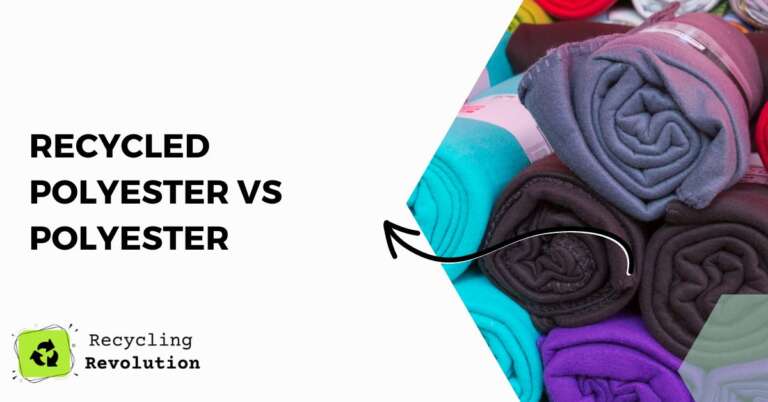Polyester vs. Recycled Polyester, both have their own merits and drawbacks, with varied implications for environmental impact, cost, and quality.
TL;DR: When it comes to the debate of Recycled Polyester vs. Polyester, recycled polyester emerges as the more environmentally-friendly option. It reduces landfill, cuts down on energy consumption, and lessens reliance on virgin resources.
However, its quality and cost may vary. Regular polyester, on the other hand, is a reliable and cost-effective material but has significant environmental downsides.
The Intricacies of Polyester
Polyester is one of the most popular synthetic fibers globally, valued for its durability, resistance to moisture and wrinkles, and affordability. It’s used in various applications, from clothing and home textiles to industrial and technical purposes.
But there’s a catch. Polyester is derived from petroleum, a non-renewable resource with a significant environmental footprint. Its manufacturing process is energy-intensive and releases harmful chemicals.
Additionally, as a non-biodegradable material, polyester can stay in landfills for hundreds of years.
Delving into Recycled Polyester
Enter recycled polyester, often touted as a greener alternative to its virgin counterpart. Recycled polyester is made by melting down existing plastic and re-spinning it into new polyester fiber. The primary sources are discarded polyester fabric and PET bottles.
So, why is recycled polyester gaining momentum? For starters, it diverts waste from landfills and the ocean, reducing environmental pollution. Secondly, it uses fewer resources and less energy than producing virgin polyester.
However, it’s essential to note that the recycling process itself can sometimes involve the use of harmful chemicals, although technological advancements are mitigating these effects.
How Does Recycled Polyester And Polyester Compare
| Aspect | Recycled Polyester | Polyester |
|---|---|---|
| Environmental Impact | Utilizes post-consumer or post-industrial waste. Reduces energy consumption by 30%-50%. Less pollution and water usage. | Derived from petroleum, requires more energy and water, leading to more pollution and carbon emissions. |
| Cost | More expensive due to the required technology, manual labor, and recycling process. However, prices may vary depending on technologies used. | Typically less expensive as the process is more established and less complex. Economies of scale also contribute to lower costs. |
| Quality | Marginally less consistent due to the varied nature of recycled materials. Functionalities are still high but might show slight differences between batches. | More uniform and consistent due to control over raw materials. May perform slightly better in some applications. Quality control can be more stringent. |
| Longevity | Slightly less durable. Though generally robust, recycled fibers might be less resilient over time due to previous wear or processing. Depending on recycling processes, longevity might be closer to virgin polyester. | Slightly more durable. More resistant to wear and tear due to uniformity and lack of previous wear on the fibers. Long-term performance might be marginally better. |
The Production Process of Polyester and Recycled Polyester
Making Polyester
Polyester is created through a chemical reaction involving petroleum, air, and water. The process is known as polymerization. It results in a polymer (a long-chain molecule) that forms the basis of the polyester material.
This polymer is then extruded or forced through a spinneret to create the fibers which are woven into polyester fabric.
The downside? This process is energy-intensive and contributes to CO2 emissions. It also relies heavily on petroleum, a non-renewable resource. Furthermore, the dyeing and finishing processes of polyester fabrics often involve the use of harmful chemicals, potentially polluting water sources.
Making Recycled Polyester
Recycled polyester, on the other hand, is made from existing polyester products or PET plastic (such as water bottles). The material is sorted, cleaned, and shredded into small bits. These bits are then melted and extruded to create new fibers, just like in the virgin polyester process.
The benefit here? By reusing existing materials, we are conserving petroleum resources and reducing the amount of waste destined for landfill or our oceans. It also consumes less energy compared to producing new polyester.
However, it’s not all rainbows and sunshine. The recycling process can sometimes involve toxic chemicals to break down the materials. And while this method is improving with new technologies, it’s a factor to consider.
Impact on Workers
The discussion around recycled polyester vs polyester is incomplete without considering the people behind the product. Both processes involve manufacturing that can expose workers to harmful chemicals.
Recycled polyester production has the potential to reduce these risks as less hazardous substances are used. But, standards can vary across locations and companies, and without proper regulation, the worker’s health can be compromised.
Managing Microfiber Shedding
Microfiber shedding is a shared concern for both polyester and recycled polyester. When we wash these fabrics, tiny plastic particles, or ‘microfibers,’ can shed and make their way into our waterways, and ultimately into the ocean.
There are, however, ways to manage this problem. Using a microfiber-catching laundry bag or a washing machine filter can significantly reduce the amount of microplastic pollution from your laundry.
Performance and Care
From a performance perspective, polyester and recycled polyester share similar properties. They are both resistant to wrinkles and shrinkage, and they dry quickly. They also hold color well, making them popular for bright prints and patterns.
In terms of care, both types of polyester are generally machine washable and dryable, though lower temperatures are recommended to prevent damage and minimize microfiber shedding.
Responsible Consumption and Disposal
Finally, while the benefits of recycled polyester over regular polyester are clear, it’s essential to practice responsible consumption regardless of the material.
This involves buying less and choosing well – opt for high-quality items that will last, and try to support companies that are transparent about their manufacturing processes.
Additionally, consider the end life of the product. As synthetic materials, neither polyester nor recycled polyester is biodegradable, so try to ensure the item is recycled at the end of its life to prevent it from ending up in a landfill.
Remember, every purchase is a vote for the kind of world we want to live in, so make it count!
Alternatives to Consider
If neither recycled polyester nor virgin polyester aligns with your needs, consider the following alternatives:
- Organic Cotton: A natural fiber that is biodegradable and renewable.
- Bamboo Fiber: Another eco-friendly alternative that is rapidly renewable and requires less water than cotton.
- Hemp: This plant is naturally resistant to pests, thus reducing the need for harmful pesticides.
Conclusion
To wrap it up, the battle between Recycled Polyester vs. Polyester isn’t one-sided. While recycled polyester holds an upper hand in terms of environmental impact, regular polyester often wins in terms of cost and quality. As conscious consumers, it’s up to us to weigh these factors and make the choice that aligns best with our values and needs.
FAQs
Is recycled polyester as durable as regular polyester?
Yes, in most cases, recycled polyester matches the durability of regular polyester.
Does using recycled polyester promote plastic consumption?
While recycled polyester does utilize plastic waste, it should not be seen as an endorsement of plastic consumption. It’s more of a solution to manage existing plastic waste.
Are there any certifications to look out for when purchasing recycled polyester?
Yes, certifications like Global Recycle Standard (GRS) and Recycled Claim Standard (RCS) ensure the integrity of the recycling claims made by manufacturers.
Note: While choosing between recycled and regular polyester, also consider the end of life of the product. Both types of polyester are not biodegradable, and appropriate recycling methods should be sought after use.

